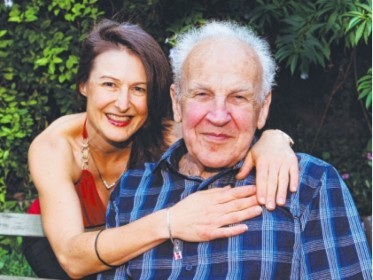
“I moved in with Dad in February 2010, about a week after Mum died. Dad had been diagnosed with dementia about a year before. With his grief, at first it was hard to discern what was dementia and what was depression. He didn’t even want to live, so for the first few months it was simply a question of finding one meaningful activity each day.
“Once we had a routine, I thought: ‘I’ve put so much time into helping prevent dementia and giving nursing homes advice about cognitive-friendly environments, let’s implement what I know.’
“All the research says once dementia starts it won’t get better, but I wondered if it had to be that way. I moved from Brisbane into Dad’s house in Sydney and worked one day a week. It was a situation where you do what you have to do. You can’t watch someone drown – especially not if you’re a trained lifeguard.
“I drew up a plan of action – and was immediately confounded by Dad making it clear he didn’t care about improving. ‘Why bother?’ he kept saying. ‘I’m all alone. Who cares if I’m fit and healthy?’
“‘You’re not alone. You’ve got me,’ I reminded him, but he didn’t believe I would stay. ‘I’m just a burden to you. You’ll disappear again,’ he said, and for the first time I discovered how upset he’d been at what he perceived as my abandonment of him.
“He’s not a vocal man so he had never told me how upset he’d been by my moving interstate and not getting married or having children. I’d thought we were mates. Mum was so dominant, we’d often been like kids giggling together in the face of her disapproval.
“I was hurt, but I also saw the irony. If I had a husband and children, I wouldn’t have been able to move in with him.
Making changes
“Despite Dad’s resistance, I introduced more fruit and vegies into his diet because the brain thrives on good nutrition. I bought him a pedometer and gym membership because exercise induces the growth of new brain cells, and I taught him visualisation to help him remember things. That worked because visualisation uses a part of the brain that isn’t affected by dementia. But the downside was if he had an intense dream it could cause confusion!
“There were times when I yelled at him because I’d given him clear instructions but he still hadn’t done something. I’d spend all day feeling terrible and he’d have forgotten about it. That doesn’t excuse me, but it was a lesson in letting go.
“I made other mistakes. I urged Dad to go to community classes, which made him feel incompetent.
“Simpler options worked much better. I taught him to juggle and bought a dart board. Playing darts is really good for him, although he never remembers the score. I could win every game if I wanted to.
“I found stress sent Dad’s functioning plummeting, but feeling needed sent his desire to participate soaring. When I suggested we volunteer to deliver Meals on Wheels, what engaged him was the fact that there were so many lonely people who appreciated his company. After that, I sought out others to visit.
Emotional journey
“The biggest learning curve happened after I stopped telling Dad what to do and asked: ‘What would you like to do?’
“He said he wanted to visit his family in Belgrade, Serbia, which he hadn’t done for 40 years.
“Travel is a massive brain booster. It stimulates our senses, we’re meeting new people and encountering challenges, and finding new ways to communicate.
“I warned Dad’s relatives he wasn’t the man they remembered. Did he prove me a liar! His functioning went through the roof, his confidence increased and his stress levels decreased.
“I think it was because he was reminded of his youth. We have made subsequent visits since and in Serbia his self-perception changes. When he’s with his 83-year-old cousin he’s not a burden, he’s the man of the house. He carries her bags and speaks his first language.
“Going to Serbia with Dad also taught me something else: we need to filter everyone’s behaviour through their history.
“During that first visit, I learned Dad’s mother had never wanted him. She had tried to abort him, to get rid of him and had beat him. That lack of love had shaped his life. What I’d dismissed as inertia, laziness and stubbornness were actually self-doubt and apprehension.
“On that flight home, he kissed me and said, ‘I love you’. He had never said that to me before.
“If I had put Dad in a home, I think he would have lost the will to live and died disappointed in me, which would have been very sad. I feel we’re both lucky I made the decision I did, although it’s still not easy and I now get carers when I need to go interstate. Dad doesn’t like that, but I need the balance or I’d be climbing the walls.
“Is Dad better after what I’ve done? Everyone says he is. He still has patchy memory loss, learns things with difficulty and gets confused, but he is better.”
Helena’s tips
- Focus on what the person can do.
- Give them choices and responsibilities, even if it’s something simple.
- Encourage them to keep a gratitude journal. It wires the brain to look for things to be thankful for.
- Keep surroundings bright and light. Research has shown brain function is worse when lighting is dim.
- Provide independence where possible.
- Keep introducing new experiences.
- Let them see their opinion matters.
- Provide a calendar to write down what will happen and what has happened. Get them to put a red line through the day when it’s over.
Source: bodyandSoul
 We are sharing information for knowledge. Presented by. SocialDiary.Net
We are sharing information for knowledge. Presented by. SocialDiary.Net



